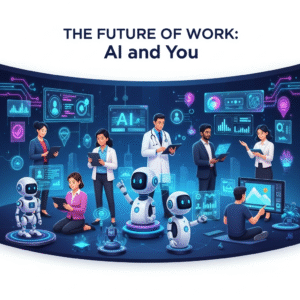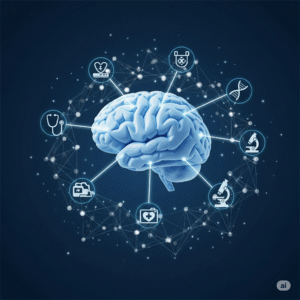For a generation that grew up with the internet, smartphones, and social media, the rapid rise of AI should feel like a natural progression. However, a deep sense of anxiety is spreading through Gen Z. A new Reuters/Ipsos poll found that 71% of Americans believe AI will cause “too many people to be permanently unemployed.” For young people just entering the workforce, this fear is deeply personal. They are graduating with student debt into a job market that seems to be closing off its most accessible entry points. Consequently, this raises a crucial question: Is Gen Z right to be afraid? This comprehensive guide will explore the latest AI job market predictions, dissect the fears surrounding AI and unemployment, and provide a blueprint for how young professionals can adapt and thrive in an AI-powered world.
The Gen Z Dilemma: A Crisis of Confidence in the Future of AI and Jobs
The data paints a troubling picture for young professionals. While the overall unemployment rate might be low, a new report from The Economic Times reveals that graduate unemployment in the U.S. has hit a 37-year high. Many roles once considered safe—like entry-level positions in law, finance, and journalism—are now under threat from generative AI. Goldman Sachs has even warned that AI-driven disruption is hitting young tech professionals the hardest. Unemployment among tech workers aged 20-30 is climbing at a rate four times faster than the national average. This creates a structural crisis for Gen Z. They are entering a competitive job market just as one of its most accessible entry points is shrinking.
Furthermore, these concerns stretch far beyond just jobs. A recent survey from Rediff.com found that 62% of young people worry about job displacement. Many are questioning the value of a college degree. This anxiety is so strong that 65% of Gen Z workers are considering switching to trade careers. They fear their white-collar jobs will be automated. The traditional career path no longer feels like a safety net. This is the new reality of the future of AI and jobs—a landscape where the only constant is change.
Case Studies: From Fear to Future-Proofing in the AI Job Market Predictions
The stories of companies and individuals who are successfully navigating this new landscape offer a roadmap for success. These real-world examples highlight how you can move from a position of fear to one of empowerment.
Case Study 1: SEB and the AI-Powered Assistant
SEB, a Nordic corporate bank, partnered with Bain & Company to develop an AI agent for its wealth management division. The agent’s purpose was not to replace financial advisors but to assist them. The AI agent enhanced customer conversations by providing suggested responses and generating call summaries. This increased efficiency by 15%. This allowed the bank’s human employees to focus on building trust and providing personalized advice. These are skills that AI cannot replicate. This case is a fantastic example of a strategic approach to the future of AI and jobs. It prioritizes human-AI collaboration over replacement.
Case Study 2: Allegis Group and Recruitment Automation
Allegis Group, a global leader in talent solutions, implemented an AI model to streamline its recruitment process. The AI automated tedious tasks like updating candidate profiles and generating job descriptions. This freed up recruiters to focus on more strategic, human-centric parts of their jobs. For example, they could now build relationships with candidates and understand their career goals. This strategic use of AI to automate the mundane and empower the human is a perfect example of a company that uses AI to enhance, not eliminate, its workforce.
Case Study 3: A Gen Z Freelancer’s Upskilling Journey
A Gen Z freelancer struggling to find clients for her text-based work saw her income drop after the rise of AI. Instead of giving up, she decided to upskill. She took a course on prompt engineering and learned to use AI as a creative partner for her writing. She then used AI to automate the administrative side of her business—invoicing, scheduling, and client communication. This freed her up to focus on the high-value work of strategic content creation. Her income rebounded within six months. This story highlights a key theme in AI job market predictions: jobs won’t disappear; they will change, and those who adapt will thrive.
A Blueprint for Navigating the Future of AI and Jobs
For Gen Z and young professionals, the key to success is not to fear AI but to embrace it as a powerful tool. Here is a step-by-step blueprint for navigating the shifting job market and building a future-proof career.
Your Action Plan for Overcoming Gen Z AI Concerns
- Identify the Automatable: The first step is to analyze your current job or desired career path. What are the most repetitive, time-consuming tasks? AI will most likely automate these tasks. For a writer, this might be a first draft. For a marketer, it might be social media scheduling.
- Become a Master of AI: The next step is to learn to use AI as a tool. Take a course on prompt engineering, learn to use AI to automate tasks, and become an expert in the tools of your trade. The goal is to move from being a user of AI to being a manager of AI. This is a crucial step for a generation dealing with Gen Z AI concerns.
- Invest in Uniquely Human Skills: AI cannot replicate critical thinking, creativity, emotional intelligence, and complex problem-solving. These skills are more valuable than ever. Invest in a course on public speaking, take a class on creative writing, or find a mentor who can help you develop these skills.
- Network and Build Your Personal Brand: In a world where AI can automate many of the administrative parts of a job, relationships become the ultimate currency. Focus on building a strong network and a personal brand that highlights your unique, human-centric skills.
Tools to Help You Thrive in the AI Job Market Predictions
The market is full of powerful tools designed to help professionals. Here are some of the most effective tools to get you started.
- Notion AI: A versatile all-in-one workspace that can be a powerful hub for your career. Its AI can help you brainstorm ideas, summarize meeting notes, and create organized, easy-to-read content outlines for your portfolio.
- Careerflow: This AI-powered tool helps with the job search. It can help you create ATS-friendly resumes, generate personalized cover letters, and track all of your applications in one place.
- LinkedIn Learning: As a leading platform for professional development, LinkedIn Learning has a massive library of courses on AI, data science, and soft skills. It’s an excellent resource for anyone looking to upskill and stay ahead of the curve.
- HubSpot Academy: HubSpot’s free academy offers a wide range of courses on AI in marketing, sales, and customer service. It’s a great way to learn how AI is being used in the business world and to gain a new set of skills.
The Future of the AI and Unemployment Debate: A Human-AI Partnership
The debate around AI and unemployment is complex and, for many, frightening. But as a recent McKinsey report on the future of work highlights, AI has the potential to enhance the way creative, legal, and business professionals work. The jobs won’t disappear; they will change. The most successful professionals will be those who view AI not as a threat, but as a powerful new tool. They will be the ones who move from being a user of AI to being a manager of AI. They will be the ones who master the uniquely human skills that AI cannot replicate.
AI in HR: Your Blueprint for a Smarter, More Human Workplace
Ultimately, the future of the AI job market predictions is a partnership. It is a partnership between human creativity and technological power, and it is a future where the most valuable skill you can have is the ability to adapt, learn, and grow.
Keyword List: AI job market predictions, future of AI and jobs, AI and unemployment, Gen Z AI concerns, AI in the workplace, future of work, AI skills, upskilling, career development, AI for business, AI trends, job market, AI adoption, skills gap, AI tools, human-AI collaboration



